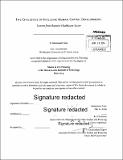| dc.contributor.advisor | Karl Seidman. | en_US |
| dc.contributor.author | Gray, Annemarie | en_US |
| dc.contributor.other | Massachusetts Institute of Technology. Department of Urban Studies and Planning. | en_US |
| dc.coverage.spatial | n-us-ma | en_US |
| dc.date.accessioned | 2014-09-19T21:39:35Z | |
| dc.date.available | 2014-09-19T21:39:35Z | |
| dc.date.copyright | 2014 | en_US |
| dc.date.issued | 2014 | en_US |
| dc.identifier.uri | http://hdl.handle.net/1721.1/90098 | |
| dc.description | Thesis: M.C.P., Massachusetts Institute of Technology, Department of Urban Studies and Planning, 2014. | en_US |
| dc.description | Cataloged from PDF version of thesis. | en_US |
| dc.description | Includes bibliographical references (pages 83-87). | en_US |
| dc.description.abstract | The pathways to enter and move up in the American labor market look very different today than fifty years ago, in part due to the erosion of traditional coordination between employers, workers, and training providers. Navigating this new reality disproportionately weighs on individuals facing limited access to education and additional barriers to employment. Some cities have experimented with sector-specific workforce development strategies to address these challenges. Using the healthcare sector in Boston as a case study, this thesis traces the evolution of one such strategy and discusses the impact of these programs on the employment outcomes for participants. Four decades of work has resulted in meaningful changes in the internal processes of some large employers and has broadened the conversation around the need to address labor market challenges. Yet these efforts have led to limited improvements in post-training employment outcomes for low-skilled individuals. | en_US |
| dc.description.statementofresponsibility | by Annemarie Gray. | en_US |
| dc.format.extent | 87 pages | en_US |
| dc.language.iso | eng | en_US |
| dc.publisher | Massachusetts Institute of Technology | en_US |
| dc.rights | M.I.T. theses are protected by copyright. They may be viewed from this source for any purpose, but reproduction or distribution in any format is prohibited without written permission. See provided URL for inquiries about permission. | en_US |
| dc.rights.uri | http://dspace.mit.edu/handle/1721.1/7582 | en_US |
| dc.subject | Urban Studies and Planning. | en_US |
| dc.title | The challenge of inclusive human capital development : lessons from Boston's healthcare sector | en_US |
| dc.type | Thesis | en_US |
| dc.description.degree | M.C.P. | en_US |
| dc.contributor.department | Massachusetts Institute of Technology. Department of Urban Studies and Planning | |
| dc.identifier.oclc | 890144106 | en_US |
